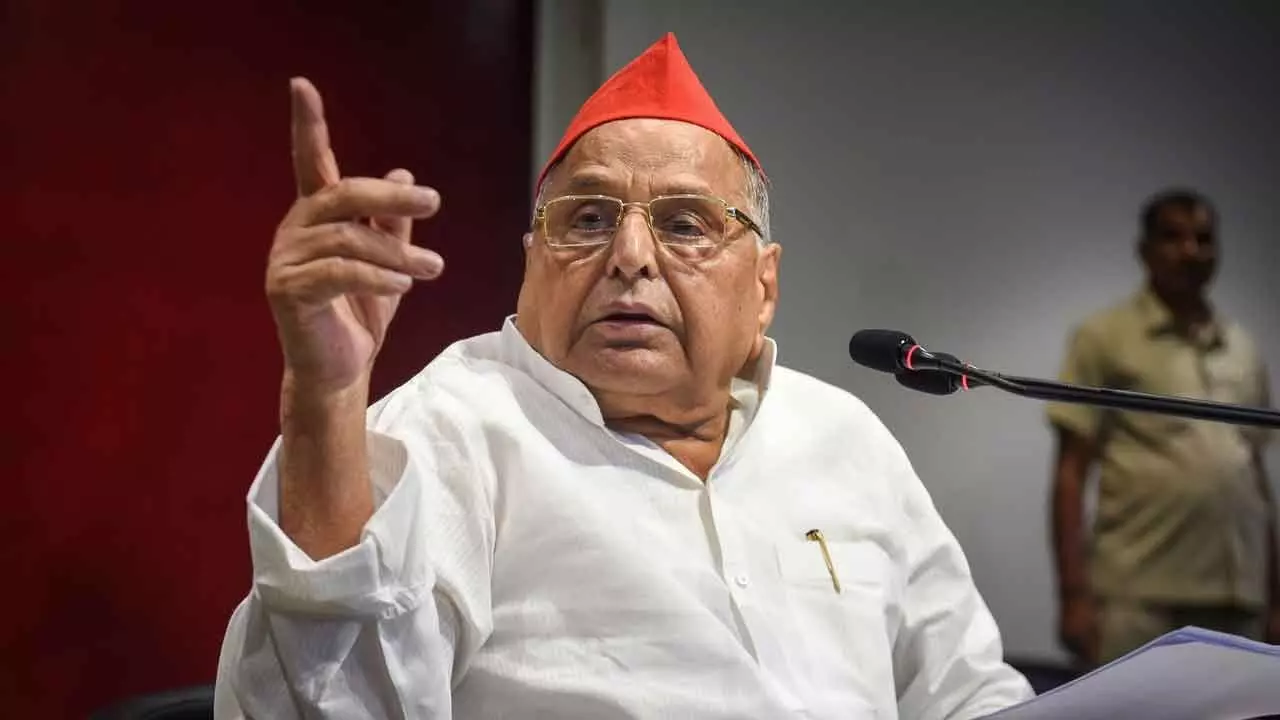Mulayam Singh Yadav: A legacy of social justice, defence reforms
His contributions to the nation's defense, though often overshadowed by other aspects of his career, are undeniable
Mulayam Singh Yadav: A legacy of social justice, defence reforms

As the Chief Minister of Uttar Pradesh, Yadav championed the cause of the marginalized, focusing on social justice, rural development, and infrastructure. His legacy is intertwined with the politics of empowerment, particularly for backward classes. While his tenure was marked by both successes and controversies, his impact on the state's socio-political landscape is undeniable
Mulayam Singh Yadav, also known as Dhartiputra and Netaji, was a versatile figure whose contributions to defence merit recognition despite criticism for his role in the Ayodhya incident. May the soul of this ardent patriot and champion of the armed forces continue to bless from heaven to late Shri Mulayam Singh ji for his unwavering patriotism and his commitment to strengthening our armed forces.
Today, if the body of a martyred soldier is reaching his home with respect, then the credit for this goes to him. While he faced widespread criticism for the incident on October 30, 1990, few are aware of his assertive and defensive stance against terrorists during his tenure as Defence Minister. A heartbreaking tradition existed for decades after independence. Families of martyred soldiers received only their caps, not their bodies.
Mulayam Singh Yadav, as Defence Minister, changed this by mandating the return of soldiers' remains with full state honours. The DM and SP would go to the martyred soldier's home. The signing of the deal for Sukhoi-30 fighter aircraft was a landmark achievement, reflecting his vision for a robust and modernized military. Mulayam Singh Yadav's approach to defence and national security was multifaceted.
He was known for his aggressive stance against terrorism, ensuring that the nation remained vigilant and proactive in dealing with threats. His defence policies were not just about acquiring advanced weaponry but also about fostering a culture of respect and honour for those who laid down their lives for the country. This decision showcases the profound respect and honour late Shri Mulayam Singh Yadav had for the armed forces and their ultimate sacrifice. Mulayam Singh Yadav, a stalwart in Indian politics, left an indelible mark on Uttar Pradesh (UP) through his tenure as Chief Minister and his broader political influence. Born on November 22, 1939, Yadav's political journey began with his election as an MLA in 1967.
He emerged as a formidable leader representing socialist ideals and championing the cause of the marginalized. As Chief Minister of UP, Yadav served three terms: from 1989 to 1991, 1993 to 1995, and 2003 to 2007. During his tenure, he implemented numerous policies aimed at empowering the backward classes, farmers, and minorities.
He was instrumental in promoting social justice and worked towards improving the socio-economic conditions of the underprivileged. Yadav's government initiated several schemes for the welfare of farmers, including waiving off agricultural loans, which significantly alleviated their financial burden.
He also focused on improving rural infrastructure, emphasizing the development of roads, irrigation systems, and rural electrification, which contributed to the overall development of UP's agrarian economy.
His tenure was also marked by efforts to improve law and order in the state, although it remained a contentious issue throughout his political career. Despite facing criticism, Yadav's policies on reservation and education for backward classes earned him a loyal support base. He played a crucial role in advocating for the implementation of the Mandal Commission report, which recommended reservations for Other Backward Classes (OBCs) in government jobs and educational institutions, thus transforming the socio-political landscape of UP and India. Akhilesh Yadav, Mulayam Singh Yadav's son, continued his father's legacy, becoming the Chief Minister of Uttar Pradesh from 2012 to 2017.
A more contemporary and tech-savvy leader, Akhilesh brought a new perspective to governance while retaining the core values of social justice and development espoused by his father. Under Akhilesh's leadership, the state saw significant infrastructural development. One of his flagship projects was the Agra-Lucknow Expressway, which became the longest expressway in India at the time and significantly reduced travel time between the two cities, boosting economic activities and connectivity.
He also launched the Lucknow Metro project, aimed at improving urban transportation and reducing congestion in the state capital. Akhilesh's tenure was marked by a strong focus on education and health. He introduced initiatives like the distribution of laptops to students to promote digital literacy and improve educational outcomes.
His government also launched the 108 Ambulance Service, ensuring timely medical assistance across the state. Furthermore, Akhilesh worked towards enhancing the state's power infrastructure, aiming for 24x7 electricity supply, and made significant strides in renewable energy projects. Both Mulayam Singh Yadav and Akhilesh Yadav faced their share of challenges and criticisms, particularly regarding law-and-order issues and political controversies.
However, their contributions to the development of Uttar Pradesh, particularly in terms of social justice, infrastructure, education, and healthcare, have left a lasting impact on the state. Their tenures highlighted a blend of traditional socialist values and modern developmental policies, aiming to uplift the socio-economic conditions of the people of Uttar Pradesh. The Yadav legacy in UP politics remains influential, symbolizing a commitment to social justice, empowerment of the marginalized, and a vision for infrastructural and economic development.
(The writer is Social Reformer and founder of International NGO Bongo Bhashi Mahasabha Foundation)

